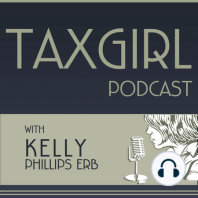34 min listen

57: Do Billionaires Pay Income Tax? Unpacking that Viral Tax Leak from ProPublica
FromTaxgirl Podcast
57: Do Billionaires Pay Income Tax? Unpacking that Viral Tax Leak from ProPublica
FromTaxgirl Podcast
ratings:
Length:
41 minutes
Released:
Aug 10, 2021
Format:
Podcast episode
Description
Earlier this month, ProPublica made waves when it published what it said was verified IRS information showing that billionaires, like Jeff Bezos and Warren Buffett, pay little in income tax compared to their massive wealth. ProPublica described the info as “an unprecedented look inside the financial lives of America’s titans.” The article caused quite a stir, both because of how they got the data and the larger discussion regarding wealth and taxes. Recent discussions of taxing the rich or even proposing a wealth tax have sparked plenty of philosophical conversations-- but what would that realistically look like for America’s uber-wealthy? On today’s episode of the Taxgirl podcast, Kelly is joined by Steve Rosenthal to chat about tax and wealth and how they intersect. Steve is a senior fellow in the Urban-Brookings Tax Policy Center at the Urban Institute, where he researches, speaks, and writes on a range of federal income tax issues, with a particular focus on business taxes. In 2013, he also was the staff director of the DC Tax Revision Commission. Before joining Urban, Rosenthal practiced tax law in Washington, DC, for over 25 years, most recently as a partner at Ropes and Gray. He was a legislation counsel with the Joint Committee on Taxation, where he helped draft tax rules for financial institutions, financial products, capital gains, and related areas. He is the former chair of the Taxation Section of the District of Columbia Bar Association. Listen to Kelly and Steve talk about billionaires and taxes: The ProPublica piece mentioned has been criticized for supposedly conflating wealth with income. Steve shares the difference between earned income and unearned income, and why we tax them differently. Simply: income tax only taxes income, not wealth. We often assume that billionaires and millionaires are in the highest tax bracket, but that’s not always the case. Income is the basis of tax liability in the American system, so wealth without income is not taxed as heavily. In 2007, Jeff Bezos famously said he paid no income tax, even though Amazon stock more than doubled in the same year. Steve says about the 16th amendment, “We have an income tax, not a wealth tax.” How do these tax principles apply to all taxpayers? Kelly and Steve discuss taxable events and how investments like stocks and real estate aren’t considered taxable income until those assets are sold. What the Biden Proposal says about gains-at-death for the mega wealthy, and what the threshold really is. As a W-2 earner, all income is reported to the IRS, and many of these folks are not reliant on investments or asset growth for their wealth. But the wealthy are usually not reliant on a wage or salary. How are investment sales taxed differently than income? What are the arguments that the tax system isn’t “fair,” versus the arguments that it is fair? Should the wealthy be taxed more heavily? Would changing the top tax rate alter how much the uber wealthy would realistically pay in overall taxes? In the philosophical discussion of whether billionaires should be taxed more, what would that even look like? There is so much opportunity in the U.S. for financial success, although recently wealth inequality has been “exacerbated.” What would happen to dynastic wealth if assets were taxed upon death? The 25 richest Americans are collectively worth over $1 Trillion. It would take over 14 million working class Americans to match that kind of wealth. Does taxing appreciated assets target small business and upper middle class more than it does the billionaires? The top 1% of Americans own 50% of the stock market. Most Americans would identify themselves as middle class, and a lot of folks don’t have an abundance of assets. Addressing wealth inequality is complicated with the way the tax code sits right now. Does...
Released:
Aug 10, 2021
Format:
Podcast episode
Titles in the series (90)
5: Following The Money: All About IRS Criminal Investigation by Taxgirl Podcast